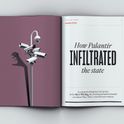Philip Collins (“Could it Happen Here?”, June) is correct to warn us about a scenario in which a right-wing populist government takes office in the UK and begins dismantling democracy. It has long been assumed that Britain has special immunities to such threats. We now need to avoid such complacency. Those who recognise the urgency of current circumstances need to minimise their differences over other matters and coalesce behind a clear set of agreed principles to counter the divisive rhetoric of the extremists.
A group statement from public figures from within and beyond politics drawing attention to the nature of the threat could be a valuable first step. It could form part of a campaign intended to avoid such a government from forming in the first place, or failing that, to scrutinise and object to its programme if it did come about.
Accompanying this, a thoroughgoing review of the likely weaknesses and strengths of the UK constitution under populist pressure should be initiated. To fail to act at all could be fatal.
Andrew Blick, professor of politics and contemporary history at King’s College London and author (with Peter Hennessy) of Could It Happen Here? (Haus)
Philip Collins asks whether a populist government in the UK could begin to dismantle democracy, and Tom Clark and Alan Rusbridger set out some of the steps they might take. They are right to do so. Democratic erosion is real.
Some institutional changes could make attacks on democracy harder. Watchdogs such as the Commissioner for Public Appointments should be undergirded by primary legislation and given enhanced independence, so they cannot be abolished or hobbled by executive fiat alone. Reforms to the House of Lords should (at the least) regulate and limit appointments, making unilateral flooding of the second chamber with pliant members impossible.
But such institutional tinkering can achieve only so much. A populist government with public support and a Commons majority could still get its way. Democracy’s only sure protection is public support for its core principles.
Ministers rightly see delivering on people’s policy priorities—on growth and public services—as important for restoring public faith in democratic politics. But they are wrong if they think this is all that is needed. Trump’s re-election shows that populist snake oil can appeal even when growth is buoyant.
Action directly to restore confidence in democracy is vital too. The core of democracy lies in respectful dialogue across diverse perspectives among and between representatives and the wider public. Such dialogue is currently badly corroded. Voters feel disrespected by politicians who spin and dissemble. The main exchange between politicians that they see is the weekly shouting match of Prime Minister’s Questions. Members of the public themselves are often unwilling to acknowledge the legitimacy of other viewpoints.
Inoculating democracy against populism above all requires a revival of healthy, pluralist dialogue. Politicians should be honest, and show they are listening. Participatory processes such as citizens’ assemblies could foster respectful public dialogue on tricky issues. The current curriculum review is a golden opportunity to place the values of good citizenship at the heart of education. A great deal needs to be done. But it would cost little money, and it is all possible.
Alan Renwick, professor of democratic politics, Constitution Unit at University College London
Much of the vulnerability of the British state to forces hostile to democracy was addressed in Charter 88’s call for a Bill of Rights and a written constitution. The charter’s demands included: rights to peaceful assembly, freedom of association and from discrimination; government agencies to be subject to the rule of law; open government; the introduction of proportional representation for all elections; and the drawing up of a written constitution “anchored in the idea of universal citizenship” to protect these reforms. To this one could add in hindsight an injunction to tell the truth.
There are arguments against a written constitution, but it is surely not beyond the wit of those seeking to protect democratic rights to devise a better set of rules than the “good chaps theory” of trusting honourable members to act honourably.
Such demands may have looked somewhat alarmist at the end of the last century, but the way that recent right-wing governments have attempted to play fast and loose with the vague nature of an unwritten set of rules should perhaps make us think again. Public engagement with such a charter would be vastly enhanced by the opportunities of digital democracy.
Austen Lynch, Garstang, Lancashire
A Trump bonanza?
Phil Tinline’s insightful account of opposition to the Trump regime (“The resistance revisited”, June) ends by observing “if the economy lifts… support [for Trump] may flourish once again”. The president’s fortunes could rocket following his measures to increase mineral production on federal land, made possible by Trump’s Executive Order 14196 for a US Sovereign Wealth Fund and the Supreme Court overturning the Chevron Doctrine, (which held that courts should defer to the view of federal agencies in interpreting ambiguous laws).
The Republican financial commentator James Rickards claims this will generate a $150 trillion bonanza, making Trump a national hero and “one of the most powerful presidents in memory”. This may be spin to sell financial news and political fiction, but if it starts a gold rush it would transform the global political economy and environment. Resisters will be condemned as anti-American, anti-business criminals who are denying US citizens their birthright to untold wealth under the earth. The opposition will need smarter strategies to stall the oligarch’s steamroller.
Titus Alexander, Galashiels
Not in our name
In the wake of the UK Supreme Court ruling that women and men are defined by their “biology”, and the Equality and Human Rights Commission’s extreme interpretation of its implications (Jess O’Thomson, “The UK Supreme Court’s ruling on sex has brought only doubt”, Prospect online, April), we write as a group of feminist academics and educators in support of trans rights, wellbeing and inclusion.
Feminism teaches us that our body does not determine our destiny; nor should legislation, policies or society’s expectations. Anti-trans campaigners say they want to exclude trans women from women’s spaces in order to protect cis women. We do not need protection from trans people. Trans people are being used as scapegoats and a distraction from the problems we actually face in society.
We need to stand together in defence of everyone’s bodily autonomy, gender expression, reproductive rights and individual freedoms. We cannot have a state or society that checks people’s genitals when they go to the toilet, work or school, play sports, or access healthcare.
As educators and academics, we have a duty to care. We must strive to make education a safer, more inclusive and equitable space. We stand with our trans and non-binary colleagues and students. We fight for everyone’s right to be educators and educated.
Our feminism is intersectional: trans and non-binary people are part of us. We demand that everyone is able to live their life safely and with dignity, without prejudice or harm. We believe trans women are women and trans men are men.
The Supreme Court ruling is not a victory for feminism; it is a victory for patriarchy. And when the patriarchy wins, everybody loses. This ruling does not speak for us. Not in our name.
Dyi Dieuwertje Huijg & Caroline Dodds Pennock, of the University of Roehampton and the University of Sheffield, respectively. This is an abridged version of a statement authored by non-trans scholars and signed (as of 23rd May) by 3,307 educators, including over 2,300 UK academics
The wrong trousers
Having read Henry Porter’s hilarious appraisal of Nigel Farage’s suspiciously convenient rustic attire (“Costume drama”, June), I decided to look online, which turned into a very long descentdown the internet’s rabbit hole, assailed throughout by images of the-man-who-may-become-prime minister raising a pint of cloudy brown cheer at seemingly every hunt meeting in the British Isles.
In each picture he was bedecked in an ensemble of those very same mustard-coloured trousers (or the bright lemon-yellow ones, pouring over the tops of those gargantuan green-grey gumboots); the Barbour coat, torn at the pocket; the sloaney flat cap; the silk paisley-print cravat, all assembled and applied to that ramrod-straight frame to create an impression of the perfect English country gentleman—or perhaps the irascible old squire, or the starchy brigadier (rtd).
Stefan Badham, Portsmouth
Down to a Mrs T
Iain Dale (Diary, June) makes a profound mistake in thinking that, just because she left office 35 years ago, we don’t have just cause to “hate” Margaret Thatcher. The major changes she and her partners wrought on our politics and society played out over those ensuing decades—and still are. We might wrestle over whether the many downsides (for instance of council house selling or denationalisation of key industries) were “unintended consequences”, ineptitude or cataclysmic errors. I’m clear that I prefer the last two options to explain her grim legacy. Yet, as we know, Mrs T would neither apologise nor explain. Her sycophants urgently need to wake from their dream.
David Miller, honorary research fellow, University of Glasgow
Iain Dale hopes his book on Mrs Thatcher is not hagiography. I’m not a “hater”, but I think of her as a triple-squanderer: of our North Sea oil wealth, of our housing, and of our water. I’ll look with interest at the book for his assessment of those achievements.
Tom Schuller, London
Gaslighting
Alan Rusbridger (“Kemi Badenoch can’t rubbish net zero—unless she has a better plan”, Prospect online, May) is right to be alarmed by Badenoch’s cavalier dismissal of climate realities. But she is also peddling a dangerous fantasy that new North Sea oil and gas drilling will somehow solve the nation’s energy woes. The truth is far more sobering: the UK has already burned most of its accessible gas, and what remains is predominantly oil—80 per cent of which is exported.
Over 14 years of Conservative rule, hundreds of new licences have translated into just 16 days’ worth of additional gas. Looking ahead to 2050, the impact would be even more paltry: new licences are expected to yield just four days of extra gas per year. This is not an energy strategy; all it would do is keep us locked into fossil fuels, leaving us vulnerable to the whims of oil dictators like Putin.
What actually keeps bills high is our dependence on volatile global gas markets. No amount of domestic drilling can change that. If Badenoch and others are serious about economic resilience and national sovereignty they should back the real solutions: a rapid transition to homegrown renewables and a national programme of home insulation. This is the best path to bringing bills down, creating jobs and reducing emissions. It’s baffling—and frankly indefensible—that this isn’t the default position for every major political party.
Tessa Khan, executive director of Uplift
Boulez at the Beeb
Ian Bostridge’s account of Pierre Boulez (Classical Notes, June) as a kind of 20th-century musical ayatollah certainly fits the bill. He reigned over the French contemporary musical scene in a way that only a Gallic public intellectual can do, in the image of André Breton and the surrealist movement, excommunicating those whom he felt weren’t in line, and often indulging in furious public debate. As the main force behind IRCAM, the prestigious and well-funded research and experimental lab for new music, he was, as the French say, incontournable, someone whose influence and power couldn’t be ignored.
I made a film about Xenakis in 1991, in the days when the BBC financed adventurous projects, and I gathered very rapidly that the Greek-born composer, one of the greatest of the century, was proscribed by Boulez. When he spoke in my film about Varèse however, he was both perceptive and generous, displaying a softer side to his character.
I agree with Bostridge that his music is often impenetrably intellectual: sharply defined, but lacking in soul. And yet, as a conductor, he was able to bring out every detail in the structure of works that expressed the opposite of his over-cerebral focus. On seeing Janaček’s From the Houses of the Dead (a Patrice Chéreau production for Wiener Festwochen, 2008) and Debussy’s Pélleas et Mélisande (a Peter Stein production for Welsh National Opera, 1992) under his brilliant conductor’s hand and intellectual grasp of the scores, I was stuck by how finely he was able to avoid the sentimentality that can sometimes swamp those two great works.
It’s worth remembering as well that Boulez was an inspired choice as musical director of the BBC Symphony Orchestra from 1971 to 1974, introducing a generally conservative British public to a repertoire including Berg, Schoenberg and Messiaen.
Mark Kidel, writer and filmmaker












